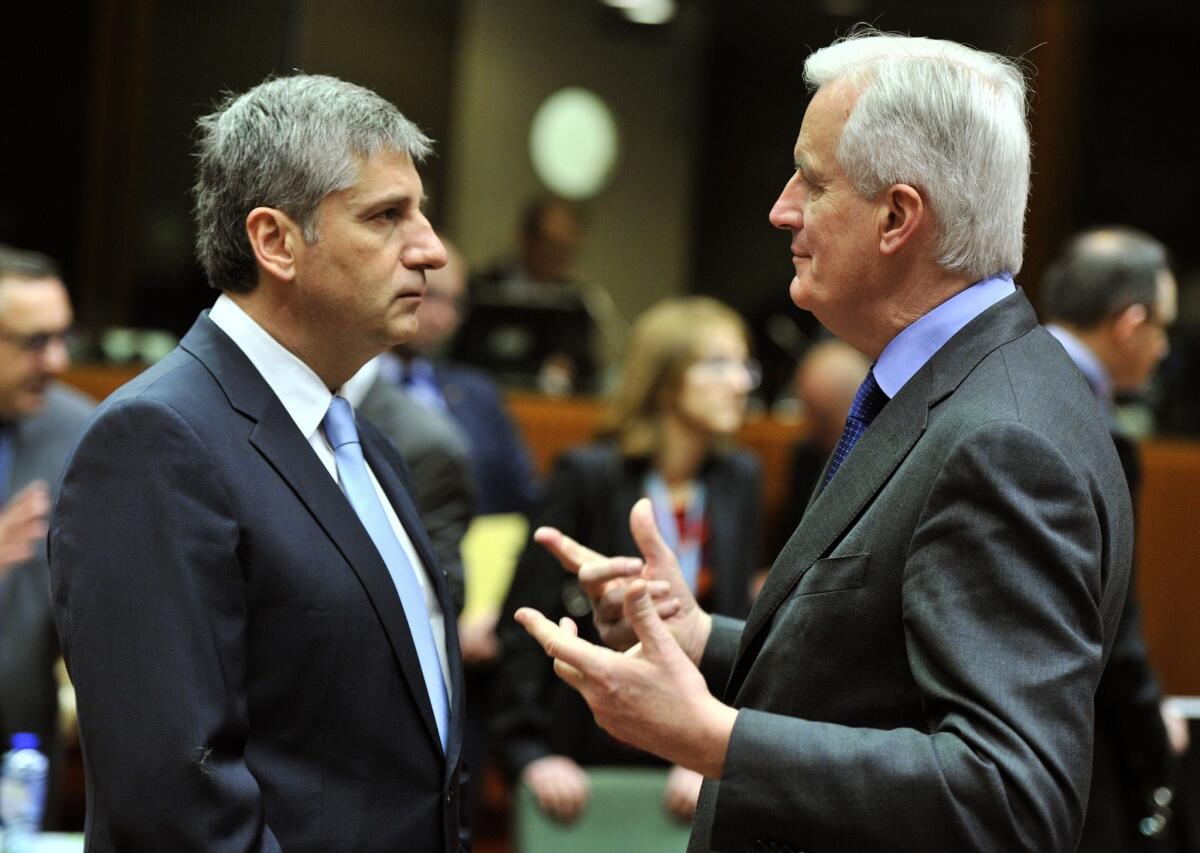European regulator concerned about new Fed rules for foreign banks

- Share via
A top European Union regulator raised concerns Wednesday about new Federal Reserve rules for foreign banks operating in the U.S., complaining the requirements were adopted unilaterally and could place an unfair burden on EU financial firms.
“We will carefully examine the new rule with the aim of assessing its potential impact on the ‘global level playing field’ in the area of banking markets, which is relevant for all financial actors, including EU banks, in order to compete on an equal footing on global markets,” said Chantal Hughes, a spokeswoman for Michel Barnier, the European commissioner for internal market and services.
The Fed’s Board of Governors voted unanimously Tuesday to require Barclays, Deutsche Bank and other large foreign banks doing business in the U.S. to hold more capital in reserve to guard against losses and undergo stress tests to determine their financial health.
The requirements are similar to those for the largest U.S. banks.
The new rules would apply to foreign banks with $50 billion or more in assets in the U.S. Those firms, such as Barclays and Deutsche Bank, would have to set up U.S. holding companies and would be required to comply with Fed risk-management standards.
The Fed estimated 15 to 20 foreign banks, many based in the European Union, would have to set up new holding companies in the U.S.
“As the financial crisis demonstrated, the sudden failure or near failure of large financial institutions can have destabilizing effects on the financial system and harm the broader economy,” Fed Chairwoman Janet L. Yellen said Tuesday before approving the rules.
“And, as the crisis also highlighted, the traditional framework for supervising and regulating major financial institutions and assessing risks contained material weaknesses,” she said.
The new rules were required by the 2010 Dodd-Frank financial reform law. Foreign banks have until July 1, 2016, to comply, a year later than originally proposed.
“We have been anticipating the release of this rule, and have had a program up and running for more than a year to plan for our compliance,” said Barclays, which is based in London. “We are reviewing the final rule, we note the extended timeline to comply and we are confident that we have options that will allow us to implement the new regulations in the prescribed timeframe.”
The EU’s Hughes said the European Commission “has sympathy for the general objective” of Fed officials to limit the risks taken by banks operating in the U.S. But she said “we reiterate our concerns about the way in which this significant regulatory reform has been introduced.”
The requirement to set up U.S. holding companies “imposes a substantial organizational cost” on foreign banks, Hughes said. And the Fed is implementing a “one-size-fits-all regulatory treatment” for all large foreign banks operating in the U.S. without regard for the regulatory requirements and supervision of their home regulators, she said.
“In general, this approach seems at odds with the longstanding efforts to move towards a globally consolidated supervision of large banking groups, under the responsibility of the authorities of the parent,” Hughes said.
Fed Governor Daniel K. Tarullo said the Fed tried to be responsive to foreign concerns and made changes to the original proposal.
But he said that there were problems during the 2008 financial crisis with foreign banks operating in the U.S., such as potential funding shortfalls that “made them disproportionate users” of emergency programs set up by the Fed.
“The most important contribution we can make to the global financial system is to ensure the stability of the U.S. financial system,” he said.
More to Read
Inside the business of entertainment
The Wide Shot brings you news, analysis and insights on everything from streaming wars to production — and what it all means for the future.
You may occasionally receive promotional content from the Los Angeles Times.










